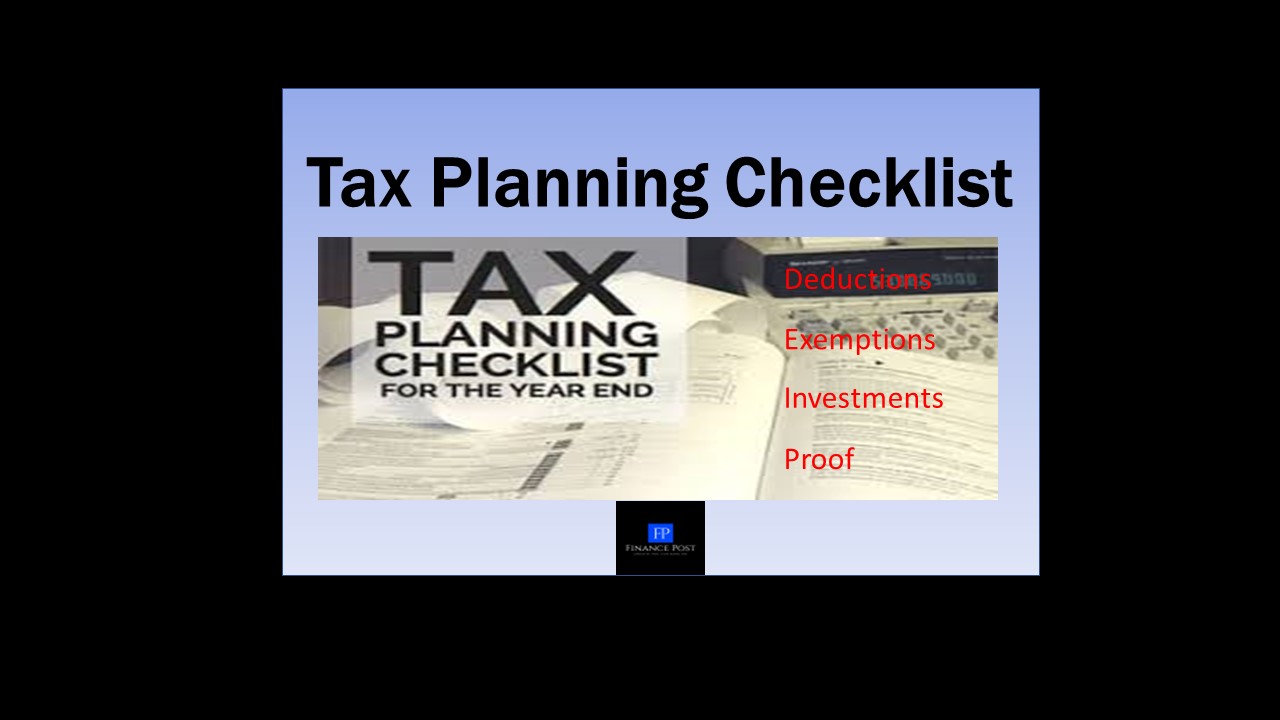
Last updated on May 15th, 2021 at 09:28 pm
A checklist that all the tax deductions have been claimed for the year before filing ITR
As the financial year is coming to an end, you are left with little time for tax planning. To help you plan your tax better and quicker, go through the below checklist and ensure the tax saving. Happy tax-planning!
1. House Rent Allowance
If you are staying in a rented apartment and your salary stack up includes House Rent Allowance (HRA), you just saved some tax. All you have to do is submit your Rent receipts, agreement copy (if required) and other details like PAN etc in your office.
In case your salary structure does not include HRA but you are staying in a rented apartment, you can still claim the deduction under section 80GG provided you satisfy certain conditions.
Click here to know how HRA helps to save tax, how to compute it and other FAQs related to HRA.
Use pre-filled ITRs to make return filing easy. Click here to know what all details will automatically get filled using the pre-filled XML.
2. Leave Travel Allowance
Many organizations include Leave Travel Allowance (LTA) in the salary stack-up of their employees due to the tax benefits attached to it. LTA is compensation paid by an employer to an employee for his travel within the country with his family or alone while he is on leave. LTA amount is tax-free under Section 10(5) of the Income-Tax Act, 1961, read with Rule 2B (Commonly known as LTA Rules).
An employee needs to submit the requisite bills as proof of travel to the employer/tax authorities to avail of this benefit. The LTA can be claimed for 2 journeys in the block of 4 calendar years.
The amount of exemption available is lower of
- the actual amount spent to reach the destination via a shortest route or
- the amount received from the employer.
Click here to know more about the computation of LTA.
3. Insurance – Life and Mediclaim
Insurance is not only a tool to safeguard yourself from future uncertainties, but it also gives you some tax benefits. Under section 80 C and 80CCC of the Income Tax Act, many life insurance schemes – term plans or unit linked – can give you tax deductions up to Rs 1,50,000/- provided, the premium paid is not in excess of 10% of Sum Assured.
A health insurance plan which is a necessity in these days also acts as an efficient tax saving tool under section 80D of the Income Tax Act. A mediclaim policy premium is tax deductible. These tax benefits are available for individuals as well as HUF.
Click here to read detail terms and conditions for 80C, 80CCC, and 80D.
4. Public provident fund (PPF)
Individuals or HUFs (Residents) can contribute in PPF. PPF offers guaranteed returns as the government determines the interest rate, so the risk element is minimal. PPF interest rate for AY 18-19 was 7.6% and for AY 19-20 it is 7.6% for the first 2 quarters and 8% for the next 2 quarters. The minimum period for a PPF account is 15 years it can be increased in the block of 5 years. A PPF account cannot be closed before maturity except in the case of the demise of the individual. Minimum investment in PPF can be of Rs. 500 and maximum Rs. 1,50,000/-. At least one deposit every year for 15 years is mandatory. Deposits in PPF account can be made in cash, cheque, demand draft or through digital banking.
5. Housing loan
Apart from other deductions under section 80C, one of the popular ones is “Housing Loan”. If you have borrowed a home loan and are repaying the same in installments, you can avail a deduction from your taxable income; for the principal repayment (under section 80C) and for interest paid during the year (under section 24) during the year. The amount of deduction of the interest paid is allowed up to a maximum of Rs. 2 lakhs. The principal repayment in the EMI can be claimed as a deduction up to a maximum of Rs. 1.5 lakh.
6. Donations
Yes! Donations can save tax. Under Section 80G of the Income Tax Act, certain donations to relief funds and charitable institutions can be claimed as a deduction. However, all donations are not eligible for deductions under section 80G. Only the donations made to the prescribed funds qualify as a deduction.
Donations made under Section 80GGA towards scientific research or rural development are also allowed as deductions. However, this deduction is not allowed for those who have an income (or loss) from a business and/or a profession.
7. NPS, Tax saving bonds, FDs and other deductions
Apart from above, there are certain payments done during the year, can qualify as a deduction under section 80C and 80CCC, 80CCD. Some popular 80C deductions include Tuition fees paid towards children’s education, investment in certain shares and debentures, investment in certain bonds, mutual funds or ULIP, National Saving Certificates, Fixed deposit schemes of certain banks with more than 5 years term, etc. Click here to see the detailed list.
Section 80CCD provides an additional tax deduction of Rs. 50,000 towards investment in the government backed pension scheme i.e. National Pension Scheme (NPS). This is over and above Rs. 1.5 lakh deduction under section 80C making the total deduction of Rs. 2 lakhs. This will help an individual to build his retirement corpus as well as a tax deduction benefit. Click here to read the detailed analysis of Sec 80CCD.
Under section 80E, Interest paid on Educational loan will be allowed as a deduction for a period of 8 years.
8. Capital gains
If you have incurred capital gains on the sale of house property but do not wish to pay capital gains tax on the same, you can invest the amounts in certain bonds or in another residential property within the prescribed time. Click here to know more about how to save tax on capital gains.
9. Depreciation benefit
One important tax saving element for a person having Income from a Business or Profession is “Depreciation”. The depreciation is used to write off the cost of an asset over its life and this reduces the profit. The Income-tax Act mentions that where the asset is used for less than 180 days in a year, then 50% of the depreciation rate is available in the same year. Hence, in case you are planning to buy an asset in next FY, then buying and putting it to use maybe in the month of March can give you 180 days of depreciation.
10. Medical Reimbursements
From FY 2018-19 the government increased Standard deduction to Rs 40,000 in lieu of tax-free medical reimbursement/transport allowance. Hence, from FY 18-19 onwards No exemption is allowed on medical reimbursements (This was Rs 15,000 till FY 2017-18).
- How to do a transaction in Digital Rupee (CBDC-R)? – A Step by step Guide - 10/12/2022
- Can you rectify your 26AS? - 20/09/2022
- Tax implications on Cashback - 09/09/2022
Disclaimer: The above content is for general info purpose only and does not constitute professional advice. The author/ website will not be liable for any inaccurate / incomplete information and any reliance you place on the content is strictly at your risk.
Follow us on Social Media by clicking below
Follow @financepost_in


Be the first to comment